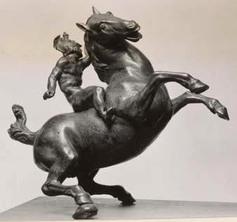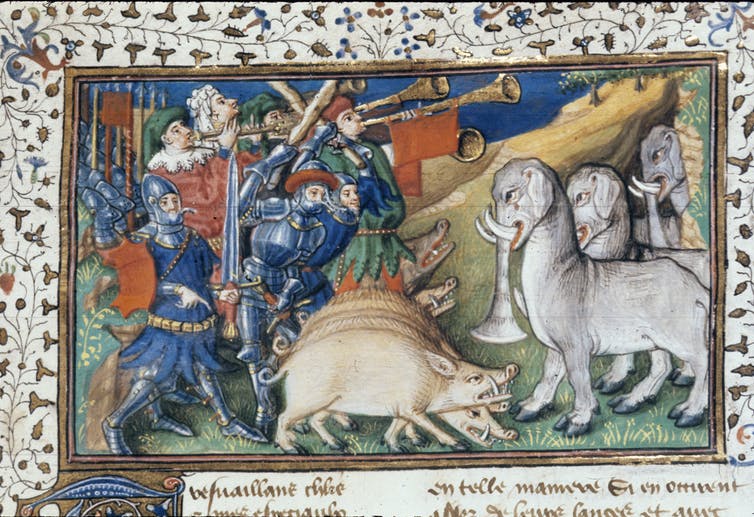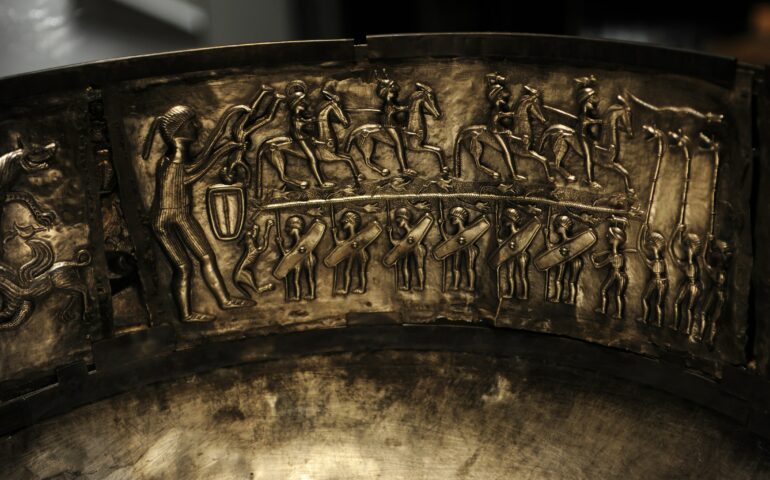As if the tumultuous din of battle is not horrendous enough, over the ages humans have discovered plenty of ways to exploit sound in warfare. I found an astonishing variety of ancient acoustic weapons while researching my book “Greek Fire, Poison Arrows, and Scorpion Bombs: Unconventional Warfare in the Ancient World.” Deploying sound in war has evolved over millennia, from natural animal sounds and music to today’s advanced sonic devices.
Calling a jig in the midst of battle
In antiquity, cavalry horses were trained to endure the piercing pipe music that led armies to battle. But a clever reversal of this training could spell victory.
In the seventh century B.C., the Kardians of Thrace, who lived in what is now northwest Turkey, were renowned for their cavalry. For entertainment, the mounted soldiers taught their horses to dance to pipes played at drinking parties. Rearing up and pawing the air, the horses kept time to the lively music.
Captured as a boy from Bisaltia in northeastern Greece, a prisoner named Naris heard about the marvelous dancing horses in the Kardian barbershop where he worked. According to the story recounted by the ancient Greek writer Athenaeus, Naris escaped, returned to Bisaltia, and prepared to make war on Kardia.

Budapest Rearing Horse and Mounted Warrior right side by E C Rae.
‘Rearing Horse and Mounted Warrior,’ Leonardo da Vinci, CC BY
He had a secret weapon: a piper girl who had also escaped from Kardia. She taught the Bisaltian soldiers songs from Kardian banquets. Naris led his army out against the Kardian cavalry and signaled for his pipers to play. Pricking up their ears at the familiar tunes, the Kardian horses reared up to dance, throwing off their riders. In the chaos, the Bisaltians crushed the Kardians.
When squeals terrorize living tanks
Cavalrymen of classical antiquity accustomed their horses to the clash of bronze weapons. But in the fourth century B.C., when Alexander the Great’s successors brought war elephants from India, the animals’ trumpeting threw horses into a frenzy.

Alexander driving off elephants with pigs and musical instruments in a detail from a French illuminated manuscript from 1420.
‘Le Livre et le vraye hystoire du bon roy Alixandre,’ The British Library, CC BY
Alexander had learned from King Porus during his 326 B.C. Indian campaign that elephants have sensitive hearing and poor eyesight, which makes them averse to unexpected loud, discordant sounds. When Alexander’s scouts reported that elephants were approaching, Porus advised Alexander’s horsemen to grab up pigs and trumpets and ride out to meet them. The shrill sound of the pigs combined with blaring trumpets sent the elephants fleeing.
In 280 B.C., the Romans first encountered war elephants, brought to Italy by Greek King Pyrrhus. The riders in the howdah seats upon their backs created an ear-splitting commotion with…



